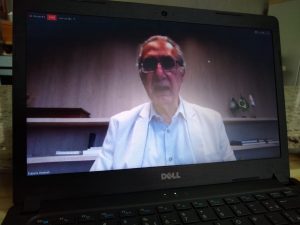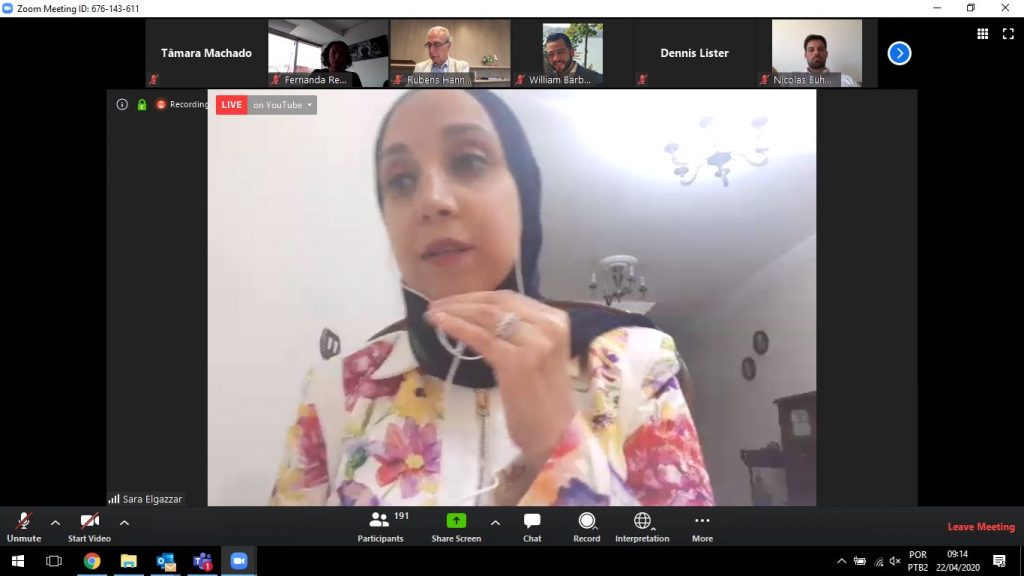São Paulo – World logistics have faced new challenges due to coronavirus, but it has quickly adapted to the new reality to maintain the supply, especially of foodstuffs, individual protection equipment and pharmaceutical products, to the countries. The sector has also used more digital mechanisms to operate. This is the view of Brazilian and foreign experts that talked on Wednesday (22) during an international webinar hosted by the Arab Brazilian Chamber of Commerce.

“When we talk about the transport of goods, the good news is that the adaptation was quick. Many countries were already working on adapting its ports and systems, including rail and road transport. They adapted quickly, and this is the main challenge and the priority now,” AASTMT College of International Transport and Logistics dean Sara Hassan Kamal Elgazzar (pictured above), said from Egypt.
In the seminar, the debates focused on the cargo transport for foreign trade. The passenger transport was totally affected by the coronavirus pandemic due to the closing of borders and the restriction of people’s movements across countries to keep the spread of the virus at bay, which was mentioned by the lecturers in the webinar.
“Transport is the first sector to feel the impact, but it doesn’t stop; indeed, it’s now seen as a key activity to fight the crisis, especially the transport of foodstuffs, hygiene products, medications, and hospital products,” National Confederation of Transport (CNT) Transport Development coordinator Fernanda Rezende said.

According to Rezende, a survey by CNT shows that road freight transport in Brazil slid by 43% in March due to sectors such as malls, factories, appliances and auto, but the port activity, tied to the foreign trade, hasn’t felt the crisis yet. “We are halfway through exporting the crop from Brazil,” she said
She says that port companies have preserved the demand and saw an increase due to agribusiness but forecast a decline over the next 60 days. Among the changes in ports caused by the pandemic, Rezende mentioned a small crisis over containers, which were retained in some ports around the world and ended up limiting exports, access control in ports, by taking temperature and measures to protect the workers, and the ban on vessel crews.
According to the lecturers, though, the crisis will leave a legacy, which is the speedup of the use of digital tools in trade and logistics. Elgazzar pointed out that the world was already going through huge macroeconomic chances even before coronavirus, such as the fourth industrial revolution and its applications, such as blockchan and e-commerce. “Coronavirus has speed it up and put pressure on it,” she said.
Rezende said that remote and more intelligent mechanisms were already being developed, but their use was sped up. She mentioned the digitization of customs procedures, the creation of new digital platforms and the use of blockchain in the supply chain, especially in navigation. “The crisis has boosted the use of digital platforms in trade relations,” she said.

Maersk Line TradeLens manager Nicolas Buhmann talked on the webinar about the huge impacts that the pandemic has caused on sea transport, but he pointed out the opportunities too, especially regarding the digitization of procedures. TradeLens is a digital platform to share documents among a supply chain, such as transport, ports, and customs authorities. He said that the platform is currently being implemented in Jordan customs.
Buhmann said that amid the coronavirus pandemic, many shipping containers reach the ports, but cannot be transported into the countries due to lack of documentation. “Governments are really working hard and putting great energy into digitizing some of their processes,” the executive said. According to him, the pandemic made countries work harder on this. He also said he’s in talks with the Arab Chamber to digitize documentation for Brazilian-Arab trade. “All of this means we’ll be stronger when this crisis ends,” he said regarding digitization.
Joining the webinar from the UAE, Emirates SkyCargo Product and Business Development vice president Dennis Lister discussed operational adaptations during the crisis. The company is using its airliners to transport crucial cargo for fighting the pandemic, such as protection equipment, pharmaceuticals and food. “Emirates is extremely busy,” said Lister.

According to the executive, the cargo is being flown to 60 destinations around the globe, with each flight carrying 50 to 60 tons. He said Emirates flew 1.5 million coronavirus test kits from China to Brazil. The company is also repatriating people, including Brazilians this week
The webinar also featured Eduardo Lima, the licensing and clearance coordinator for cooperative Aurora, Eduardo Lima, who asked questions about marine transportation. Aurora is one of the major Brazilian animal protein producers. Ademir Bazzotti, the director of Morocco’s OCP Fertilizers in Brazil, discussed the company’s pandemic experience. OCP supplies fertilizers and phosphate for animal feed manufacturing to Brazil.
“We have the responsibility to keep operating, so that the food supply chain will keep going,” said Bazzotti. Brazil is not self-sufficient in fertilizers, and it imports much of the product that goes into its farming. The director explains that OCP is 100% operational amid the pandemic, with staff working from home wherever possible – that includes operations in Brazil.

The webinar was kicked off and hosted by Arab Chamber president Rubens Hannun, with input from the Chamber’s secretary-general Tamer Mansour. Hannun explained that the topic for the seminar was chosen because logistics is crucial to keeping the world supplied. Brazil is a major supplier of food items to Arab countries, whose climate does not permit enough local production to meet demand.
“Producing countries, including Brazil, which is a major producer, have a social duty to make sure there is enough food for its partners, especially during a crisis. These partner countries must be absolutely certain that the food will get to them in these trying times,” said Hannun. The Arab Chamber hosted its first webinar on April 8, on food supplies. The online event featured Brazil’s Agriculture minister Tereza Cristina and Union of Arab Chambers secretary-general Khaled Hanafy.
Translated by Gabriel Pomerancblum




